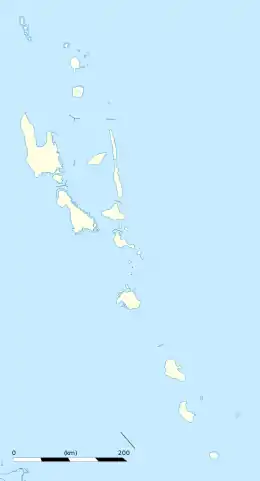Fanla
Fanla is a small village situated in the north of Ambrym Island, in the archipelago of Vanuatu in Melanesia, in the province of Malampa. The original name of this place was Saanembur Lonbato.
Fanla
Saanembur Lonbato | |
|---|---|
Village | |
 Fanla Location in Vanuatu | |
| Coordinates: 16°08′S 168°08′E | |
| Country | |
| Province | Malampa Province |
| Island | Ambrym |
| Population (2009) | |
| • Total | 250 |
| Time zone | UTC+11 (VUT) |
This is a Kastom Village, which represents the traditional values of the region. The village population is about 250 persons. Wanmelbu, a legendary resident, created the foundations of the customary chief ranks still current in the northern part of the island. His eldest son, Tingtingru, had a dream vision of tams-tams (atingting), major components of the traditional tribal art of North Ambrym.
By Ambrym tradition, the people who live in the village of Fanla are all, without exception, the descendants of Wanmelbu.
Notable residents
- Magetafanla Roromal
- According to oral tradition, he met captain James Cook (who actually saw the island only from the sea). Cook allegedly baptized the island under the name of the welcome gift presented by Roromal himself, an ignam, by pronouncing the words "am rêm" ("Here is your yam"). This phrase later became Ambrem or Ambrym. (The ancient name of the island was "Tumurin".)
- Magekon Malmere
- The first son of Fanla to repeat the ranking process.
- Bule Tainmal
- The most lauded leader of the island's history.[1]
- Tofor-kon Rengrengmal
- The last person to have reached the high ranks, in 1972; died in 1999.
Genealogy of the Chiefs of Fanla Village
- Golbahan
- Tanmonong Bariu Meto Bussumel
- Tanmonong Libu
- Magetafanla Roromal
- Magekon Malmere
- Bule Tainmal (? – 1972)
- Tofor Rengrengmal (1921–1999)
- Bonglibu César (1962)
- Ben Wiu Meltofor (1984)
References
- Rio, Knut Mikjel (2007). "Of Yams and Men". The Power of Perspective: Social ontology and agency on Ambrym Island, Vanuatu. Berghahn Series. Berghahn Books. pp. 126–128. ISBN 978-1-84545-293-3.
Tainmal, the great historical mal of Fanla, and at the time assessor of the colonial government, led the candidates around in a spiral formation towards the objectification of the grade itself: the tree-fern bwerang.
This article is issued from Wikipedia. The text is licensed under Creative Commons - Attribution - Sharealike. Additional terms may apply for the media files.